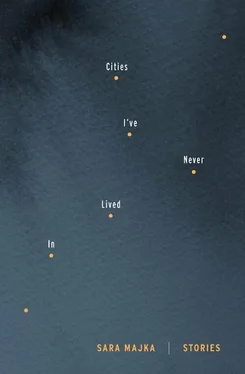Sara Majka - Cities I've Never Lived In - Stories
Здесь есть возможность читать онлайн «Sara Majka - Cities I've Never Lived In - Stories» весь текст электронной книги совершенно бесплатно (целиком полную версию без сокращений). В некоторых случаях можно слушать аудио, скачать через торрент в формате fb2 и присутствует краткое содержание. Год выпуска: 2016, Издательство: Graywolf Press, Жанр: Современная проза, на английском языке. Описание произведения, (предисловие) а так же отзывы посетителей доступны на портале библиотеки ЛибКат.
- Название:Cities I've Never Lived In: Stories
- Автор:
- Издательство:Graywolf Press
- Жанр:
- Год:2016
- ISBN:нет данных
- Рейтинг книги:3 / 5. Голосов: 1
-
Избранное:Добавить в избранное
- Отзывы:
-
Ваша оценка:
Cities I've Never Lived In: Stories: краткое содержание, описание и аннотация
Предлагаем к чтению аннотацию, описание, краткое содержание или предисловие (зависит от того, что написал сам автор книги «Cities I've Never Lived In: Stories»). Если вы не нашли необходимую информацию о книге — напишите в комментариях, мы постараемся отыскать её.
offers stories that reveal, with great sadness and great humor, the ways we are most of all citizens of the places where we cannot be.
Cities I've Never Lived In
A Public Space
ADVANCE PRAISE FOR “A human and eloquent exploration of isolation.” —Publishers Weekly
“These stories are a marvel that will break your heart. . Majka’s debut is breath-stopping.” —A.N. Devers, Longreads
"These stories are sparse and fierce and move elegantly to the very heart of the reader. The voice remains with me, has left an emotional trace like a person I lived with and loved and often recall.” —Catherine Lacey, author of Nobody is Ever Missing
“A collection that leaves you longing — as one longs to return to much loved, much missed homes and communities and cities — for places that you, the reader have never been. Prodigal with insight into why and how people love and leave, and love again. Humane, dazzling, and knowing.”
— Kelly Link, author of Magic for Beginners
“Like Alice Munro and Raymond Carver, Sara Majka writes stories of people on society’s ragged edge — in money trouble, work trouble, heart trouble — and does so with tremendous subtlety and a grave sophistication all her own. Every one of the spare sentences in this book is heavy with implication and insight. It’s impossible to read these stories too closely.” —Salvatore Scibona, author of The End
“I cannot remember a book that more perfectly achieves the sensation of, as Majka describes, ‘being nowhere, or in someone else’s life, or between lives.’ With each subsequent story, the feeling intensified until, as only the very best writing can do, I felt transformed by the experience. Cities I’ve Never Lived In is a momentous book, and Majka is a writer operating at a very high level of insight.” —Kevin Wilson, author of The Family Fang
“
is like no other book I’ve read: graceful and poignant, original and wise. Its stories unfold in the bars, thrift stores, and rented rooms of a Maine you won’t find in tourist guidebooks or outdoor catalogs, but their deeper territory is the human heart: loss and loneliness, desire and grief, and the strange beauty to be found in desolation. Like the memories that haunt her watchful, wounded characters, Sara Majka’s exquisite prose stayed with me long after I had turned the last page of this terrific debut.” —Mia Alvar, author of In the Country
“This is a beautiful and destabilizing book filled with ghosts. Majka is a writer I’d read anything by.” —Diane Cook, author of Man Vs. Nature
“The characters in Sara Majka’s haunting collection drift through cities and landscapes like refugees from feeling, searching for something they can’t begin to name. These stories confound all our expectations: they fade in and out like memories or dreams, at once indelible and impossible to grasp. Again and again they broke my heart. Majka is a daring and enormously gifted writer, and this is a thrilling, devastating debut.” —Garth Greenwell, author of What Belongs to You












